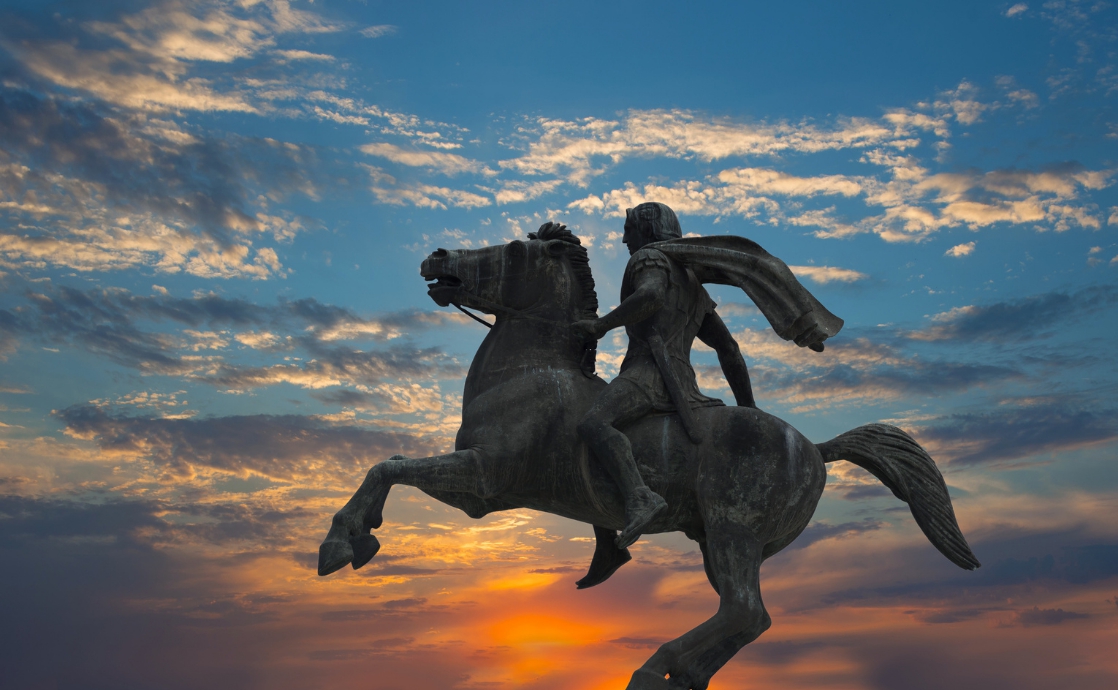The views expressed in our content reflect individual perspectives and do not represent the authoritative views of the Baha'i Faith.
You’ve probably heard it many times – “the bloodiest wars in history have been religious wars.” This seems like conventional wisdom, but is it true? Let’s examine the facts and find out for ourselves.
You may be surprised to learn that the original “bloodiest wars” quote comes, of all people, from disgraced former United States president Richard M. Nixon, who ordered the secret carpet bombing of Cambodia (and later its invasion) by U.S. forces. That bombing campaign killed an estimated 100,000 people, but it also resulted in the destabilization and fall of the Cambodian government and the accession to power of the Khmer Rouge rebels, who mounted a horrendous genocide that killed perhaps two million Cambodians. Bloody, indeed.
RELATED: Weapons of War: the Malignant Fruits of Material Civilization
So it’s easy to blame religion for wars started by men, but the truth is much more complex. In the writings of Abdu’l-Baha, the Baha’i teachings recognize that war has a whole host of multivariate causes, while proclaiming that no possible cause justifies such degraded human behavior:
… in our illumined age, God teacheth that conflicts and disputes are not allowable …
Still do we see his world at war from pole to pole. There is war among the religions; war among the nations; war among the peoples; war among the rulers. What a welcome change would it be, if only these black clouds would lift from off the skies of the world, so that the light of reality could be shed abroad! If only the darksome dust of this continual fighting and killing could settle forever, and the sweet winds of God’s loving-kindness could blow from out the well-spring of peace. Then would this world become another world, and the earth would shine with the light of her Lord.
So, to get an accurate portrayal of religion and war, let’s explore what the historians have to say about humanity’s religious wars.
First, most experts define a religious war as one primarily caused by differences in religion – and only identify a small, single-digit percentage out of all 1,763 known/recorded historical armed conflicts as religious in nature.
Second, the authoritative reference The Encyclopedia of War, edited by Gordon Martel, estimates that only six per cent of the wars in human history can actually be labelled religious wars.
Third, according to Irfan Omar and Michael Duffey’s widely-respected research work Peacemaking and the Challenge of Violence in World Religions, multiple studies of supposed cases of inter-religious violence have concluded that in general the violence is strongly driven by ethnic animosities, not religion. This conclusion, which most modern scholars now accept, views wars we might’ve typically and previously seen as “religious” in nature as originating from underlying secular, economic, or political causes.
For example: the so-called “Troubles” in Northern Ireland, which many regarded as a religious war between Catholics and Protestants, were really nationalistic and not very religious at all. Because the native Irish were mostly Catholic, and the British-sponsored immigrants were mainly Protestant, the struggle became a proxy battle between the two countries and their cultures, classes, ethnicities, and policies, rather than a war caused primarily by religion.
Of course, some wars do involve religion, so let’s consider those examples, too.
How Does Religion Engender War?
Despite the peaceful original teachings of the major Faiths, as we all know, the specter of religious wars has haunted human history for thousands of years – and despite the prominent teachings on peace in the Bhagavad Gita, the Torah, the Bible, and the Qur’an, those holy books also contain much about war.
RELATED: What War Did to Me – and to Us
When religious groups or countries of different Faiths go to war with one another, who’s to blame? Should we assign the responsibility for those hostilities to religion itself, as several current atheist pundits and philosophers have done?
The Baha’i teachings offer a nuanced answer to those important questions, as explained by Abdu’l-Baha in a talk he gave in Paris:
But do not therefore attribute to the Masters and Prophets the evil deeds of their followers. If the priests, teachers and people, lead lives which are contrary to the religion they profess to follow, is that the fault of Christ or the other Teachers?
The people of Islam were taught to realize how Jesus came from God and was born of the Spirit, and that He must be glorified of all men. Moses was a prophet of God, and revealed in His day and for the people to whom He was sent, the Book of God.
Muhammad recognized the sublime grandeur of Christ and the greatness of Moses and the prophets. If only the whole world would acknowledge the greatness of Muhammad and all the Heaven-sent Teachers, strife and discord would soon vanish from the face of the earth, and God’s Kingdom would come among men.
The people of Islam who glorify Christ are not humiliated by so doing.
Christ was the Prophet of the Christians, Moses of the Jews – why should not the followers of each prophet recognize and honour the other prophets also? If men could only learn the lesson of mutual tolerance, understanding, and brotherly love, the unity of the world would soon be an established fact.
Baha’u’llah spent His life teaching this lesson of Love and Unity. Let us then put away from us all prejudice and intolerance, and strive with all our hearts and souls to bring about understanding and unity …
From a Baha’i perspective, this elucidates one of the primary reasons why the Creator regularly renews religion.
In the initial revelation of any great Faith, the penetrating teachings of its founder evince enormous power to affect and alter the hearts of humanity. Those teachings, when they reach their zenith of spiritual luminescence in the world, have tremendous impact, not only on individuals but on civilization itself. However, the Baha’i teachings explain, every religion also eventually undergoes an inevitable period of decline, when its influence wanes, its unity fractures, and its followers fail to adhere to its original precepts and teachings. Like years, religions have seasons, and in their falls and winters they often turn into the shadows of their former selves.
Historically, most of the wars that involve religion occurred during those periods of decline – but they also tend to happen when corrupt rulers, authoritarian dictators, and political parties use and co-opt the name of religion to justify their hostile actions and enlist the support of the masses. When Hitler’s armies invaded Germany’s neighboring countries, to cite just one example, he used Christianity as his justification, saying that the Nazis practiced something he called “positive Christianity” and characterizing Christ as “an Aryan fighter” against the Jewish people.
We can hardly blame religions, as Abdu’l-Baha pointed out, for the “evil deeds of their followers.”
We can, though, study the history of the peacemaking principles common to all religions, and recognize in those teachings a common through-line, a consistent set of spiritual morals and laws summoning us to a warless world. Despite the pain and persecution people heaped upon them when they delivered their revelations, the greatest heroes of kindness and conciliation – Krishna, Buddha, Abraham, Moses, Christ, Muhammad, the many messengers of the world’s Indigenous populations, and most recently the Bab and Baha’u’llah – have heroically beckoned all beings toward love, beauty, compassion, and peace.
How can we follow their shining examples? In the next essay in this series, we’ll examine what the Baha’i teachings recommend, and learn about the life of one selfless Baha’i hero.
















Comments
Sign in or create an account
Continue with Googleor